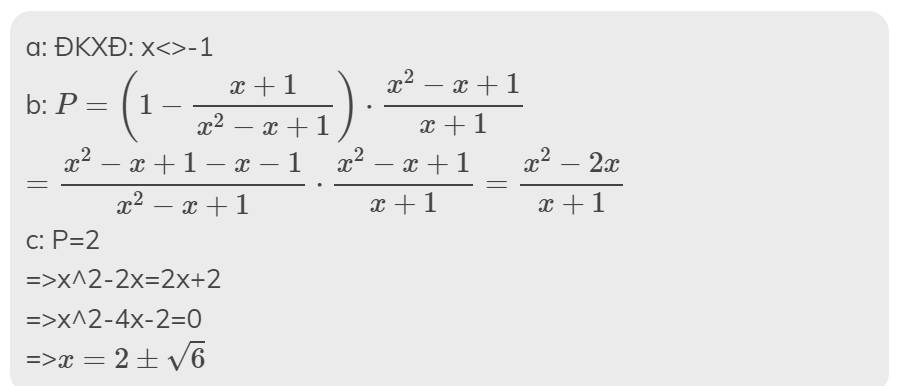P = \(\left(1-\dfrac{x^2}{x^2-x+1}\right):\dfrac{x^2+2x+1}{x^3+1}\)
a)Tìm điều kiện của x để biểu thức P xác định
b)Rút gọn biểu thức P
c)Với giá trị nào của x thì P = 2
d)Tìm các giá trị nguyên của x để P nhận giá trị nguyên
Hãy nhập câu hỏi của bạn vào đây, nếu là tài khoản VIP, bạn sẽ được ưu tiên trả lời.



a: ĐKXĐ: x<>-1
b: \(P=\left(1-\dfrac{x+1}{x^2-x+1}\right)\cdot\dfrac{x^2-x+1}{x+1}\)
\(=\dfrac{x^2-x+1-x-1}{x^2-x+1}\cdot\dfrac{x^2-x+1}{x+1}=\dfrac{x^2-2x}{x+1}\)
c: P=2
=>x^2-2x=2x+2
=>x^2-4x-2=0
=>\(x=2\pm\sqrt{6}\)

a) \(x>0,x\ne1\)
b) \(P=\left(\dfrac{\sqrt{x}}{\sqrt{x}-1}-\dfrac{1}{x-\sqrt{x}}\right):\left(\dfrac{1}{\sqrt{x}+1}+\dfrac{2}{x-1}\right)\)
\(=\left(\dfrac{\sqrt{x}}{\sqrt{x}-1}-\dfrac{1}{\sqrt{x}\left(\sqrt{x}-1\right)}\right):\left(\dfrac{1}{\sqrt{x}+1}+\dfrac{2}{\left(\sqrt{x}-1\right)\left(\sqrt{x}+1\right)}\right)\)
\(=\dfrac{x-1}{\sqrt{x}\left(\sqrt{x}-1\right)}:\dfrac{\sqrt{x}-1+2}{\left(\sqrt{x}-1\right)\left(\sqrt{x}+1\right)}\)
\(=\dfrac{\left(\sqrt{x}-1\right)\left(\sqrt{x}+1\right)}{\sqrt{x}\left(\sqrt{x}-1\right)}:\dfrac{\sqrt{x}+1}{\left(\sqrt{x}-1\right)\left(\sqrt{x}+1\right)}\)
\(=\dfrac{\sqrt{x}+1}{\sqrt{x}}:\dfrac{1}{\sqrt{x}-1}=\dfrac{\sqrt{x}+1}{\sqrt{x}}.\left(\sqrt{x}-1\right)=\dfrac{x-1}{\sqrt{x}}\)
c) \(P< 0\Rightarrow\dfrac{x-1}{\sqrt{x}}< 0\) mà \(\sqrt{x}>0\Rightarrow x-1< 0\Rightarrow x< 1\Rightarrow0< x< 1\)

Bài 1: ĐKXĐ:`x + 3 ne 0` và `x^2+ x-6 ne 0 ; 2-x ne 0`
`<=> x ne -3 ; (x-2)(x+3) ne 0 ; x ne2`
`<=>x ne -3 ; x ne 2`
b) Với `x ne - 3 ; x ne 2` ta có:
`P= (x+2)/(x+3) - 5/(x^2 +x -6) + 1/(2-x)`
`P = (x+2)/(x+3) - 5/[(x-2)(x+3)] + 1/(2-x)`
`= [(x+2)(x-2)]/[(x-2)(x+3)] - 5/[(x-2)(x+3)] - (x+3)/[(x-2)(x+3)]`
`= (x^2 -4)/[(x-2)(x+3)] - 5/[(x-2)(x+3)] - (x+3)/[(x-2)(x+3)]`
`=(x^2 - 4 - 5 - x-3)/[(x-2)(x+3)]`
`= (x^2 - x-12)/[(x-2)(x+3)]`
`= [(x-4)(x+3)]/[(x-2)(x+3)]`
`= (x-4)/(x-2)`
Vậy `P= (x-4)/(x-2)` với `x ne -3 ; x ne 2`
c) Để `P = -3/4`
`=> (x-4)/(x-2) = -3/4`
`=> 4(x-4) = -3(x-2)`
`<=>4x -16 = -3x + 6`
`<=> 4x + 3x = 6 + 16`
`<=> 7x = 22`
`<=> x= 22/7` (thỏa mãn ĐKXĐ)
Vậy `x = 22/7` thì `P = -3/4`
d) Ta có: `P= (x-4)/(x-2)`
`P= (x-2-2)/(x-2)`
`P= 1 - 2/(x-2)`
Để P nguyên thì `2/(x-2)` nguyên
`=> 2 vdots x-2`
`=> x -2 in Ư(2) ={ 1 ;2 ;-1;-2}`
+) Với `x -2 =1 => x= 3` (thỏa mãn ĐKXĐ)
+) Với `x -2 =2 => x= 4` (thỏa mãn ĐKXĐ)
+) Với `x -2 = -1=> x= 1` (thỏa mãn ĐKXĐ)
+) Với `x -2 = -2 => x= 0`(thỏa mãn ĐKXĐ)
Vậy `x in{ 3 ;4; 1; 0}` thì `P` nguyên
e) Từ `x^2 -9 =0`
`<=> (x-3)(x+3)=0`
`<=> x= 3` hoặc `x= -3`
+) Với `x=3` (thỏa mãn ĐKXĐ) thì:
`P = (3-4)/(3-2)`
`P= -1/1`
`P=-1`
+) Với `x= -3` thì không thỏa mãn ĐKXĐ
Vậy với x= 3 thì `P= -1`

a) ĐKXĐ: \(x\ne-10;x\ne0;x\ne-5\)
b) \(P=\dfrac{x^2+2x}{2x+20}+\dfrac{x-5}{x}+\dfrac{50-5x}{2x\left(x+5\right)}\)
\(=\dfrac{x^2+2x}{2\left(x+10\right)}+\dfrac{x-5}{x}+\dfrac{50-5x}{2x\left(x+5\right)}\)
\(=\dfrac{x\left(x^2+2x\right)\left(x+5\right)}{2x\left(x+10\right)\left(x+5\right)}+\dfrac{2\left(x-5\right)\left(x+10\right)}{2x\left(x+10\right)\left(x+5\right)}+\dfrac{\left(50-5x\right)\left(x+10\right)}{2x\left(x+5\right)\left(x+10\right)}\)
\(=\dfrac{x^4+7x^3+10x^2+2x^2+10x-100+500-5x^2}{2x\left(x+10\right)\left(x+5\right)}\)
\(=\dfrac{x^4+7x^3+7x^2+10x+400}{2x\left(x+10\right)\left(x+5\right)}\)
c) \(P=0\Rightarrow x^4+7x^3+7x^2+10x+400=0\Leftrightarrow...\)
Số xấu thì câu c, d làm cũng như không. Bạn xem lại đề.

Lời giải:
a. ĐKXĐ: $x>0; x\neq 1$
b. \(P=\left[\frac{x}{\sqrt{x}(\sqrt{x}-1)}-\frac{1}{\sqrt{x}(\sqrt{x}-1)}\right]: \left[\frac{\sqrt{x}-1}{(\sqrt{x}-1)(\sqrt{x}+1)}+\frac{2}{(\sqrt{x}-1)(\sqrt{x}+1)}\right]\)
\(=\frac{x-1}{\sqrt{x}(\sqrt{x}-1)}:\frac{\sqrt{x}+1}{(\sqrt{x}-1)(\sqrt{x}+1)}=\frac{(\sqrt{x}-1)(\sqrt{x}+1)}{\sqrt{x}(\sqrt{x}-1)}:\frac{\sqrt{x}+1}{(\sqrt{x}-1)(\sqrt{x}+1)} =\frac{\sqrt{x}+1}{\sqrt{x}}:\frac{1}{\sqrt{x}-1}=\frac{(\sqrt{x}-1)(\sqrt{x}+1)}{\sqrt{x}}=\frac{x-1}{\sqrt{x}}\)
c.
$P<0\Leftrightarrow \frac{x-1}{\sqrt{x}}<0$
$\Leftrightarrow x-1<0$
$\Leftrightarrow x<1$. Kết hợp đkxđ suy ra $0< x<1 $